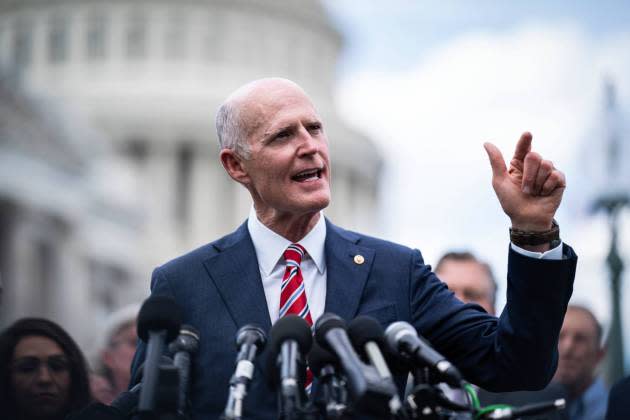Sen. Rick Scott Is Coming for Mitch McConnell’s Job … Again

Former Florida governor and first-term Senator Rick Scott announced Wednesday that he is gunning to replace Mitch McConnell as Senate Republican leader after trying and failing to do so following the 2022 midterm election.
“I believe that our voters want us to use this leadership election to make a choice to upend the status quo in Washington,” Scott wrote in a letter to his Republican colleagues, the Wall Street Journal reported. “If you also believe this to be true and want a leader dedicated to that principle, I would be honored to have the opportunity to earn your support.”
Scott is the third Republican senator to express interest in the position since McConnell announced he would step down in February, after Senate Minority Whip Sen. John Thune (R-S.D.) and former whip Sen. John Cornyn (R-Texas).
🚨 I am running to be the next Senate Republican leader.
Excited to discuss this and more on the @IngrahamAngle tonight at 7:40 p.m. ET. TUNE IN! https://t.co/yIV89pMY7T— Rick Scott (@SenRickScott) May 22, 2024
Scott had previously tried to unseat McConnell as Senate Majority Leader in 2022 after Republicans performed worse than expected during the midterm elections. After Scott was unable to secure enough votes, McConnell responded by removing him from the Senate Commerce Committee, much to Scott’s consternation.
“I opposed him because I believe we have to have ideas, fight over ideas,” Scott told CNN at the time.
Scott will also have to win re-election before he can be considered for Senate leadership; his likely Democratic opponent, former Rep. Debbie Mucarsel-Powell from Miami, said Scott was “self-serving” to seek the Senate Republican leadership position and “would be a disaster for Americans.”
“We all know if Rick Scott gets elected to Senate leadership, he won’t hesitate to push his toxic and out-of-touch agenda to sunset Social Security and Medicare,” she said in a statement responding to the news of his candidacy.
Senate leadership is typically voted on by members after the general election via secret ballot. With multiple candidates pursuing leadership roles this year, there may be multiple rounds of voting before one wins a clear majority. If no majority is reached, the candidate with the fewest votes drops out and ballots are recast, according to GOP precedent.
More from Rolling Stone
GOP Senate Candidate Spent Campaign Money on Strip Club: Report
The Hottest Place to Pledge Allegiance to Trump Is Manhattan Criminal Court
Rick Scott Suggests He Was 'Persecuted' Over Giant Medicare Fraud
Best of Rolling Stone

 Yahoo News
Yahoo News 